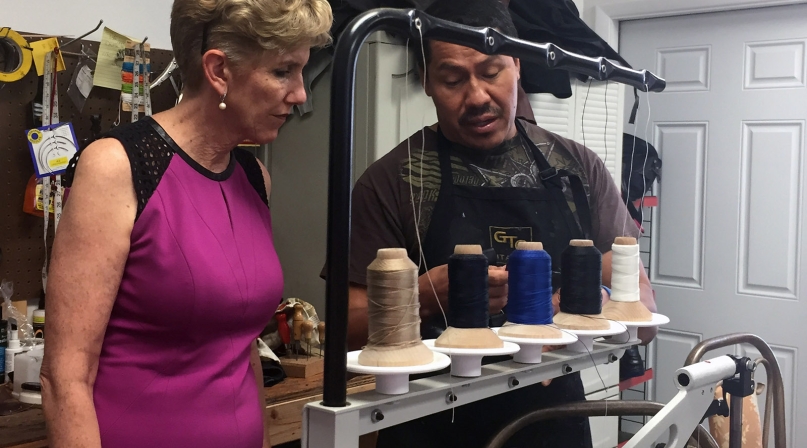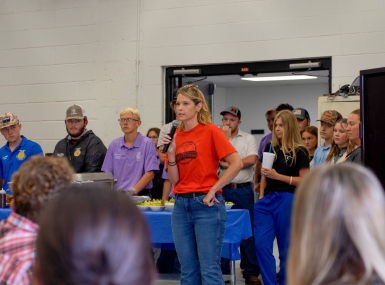Problem:
|
A decline in manufacturing and negative news coverage following the 2016 presidential election affected the image of Erie County, Pa.
|
Solution:
|
The county executive visited 50 businesses in 50 weeks to get a better understanding of the county’s business community.
|
“People are always grateful when you show up at their door.”
That’s the ambitious approach County Executive Kathy Dahlkemper took when she embarked on a yearlong project to better understand the local economy in Erie County, Pa.
Throughout the project, known as “50 in 50,” Dahlkemper visited 50 local businesses in 50 weeks. She met with business owners, toured facilities, explored the economic development operations of the county and shared information she gathered with the public during the yearlong tour in 2017. Dahlkemper and her team documented the list of the businesses she visited and posted her experiences on a weekly blog.
The idea for the project stemmed from a decline in the county’s manufacturing base, specifically when GE Transportation’s locomotive-building facility, which was the county’s largest employer, laid off 1,500 workers.
Additionally, Erie County received negative news coverage during the 2016 presidential election when the usually Democratic county voted Republican. Kristin Bowers, Erie County public information officer, said the coverage painted the county as "faded like an industrial wasteland" and "putting its hopes on Donald Trump."
Dahlkemper wanted to address economic challenges in the county through the voice of business leaders as opposed to news stories or numbers on a data sheet.
“I knew personally of many businesses that were actually growing and expanding, but I wanted to get beyond my own personal knowledge… and really get out there and dive deeper into this to see what truly was the state of business in Erie County,” Dahlkemper said.
Bowers accompanied Dahlkemper on her visits where she helped with behind-the-scenes work, took photos and posted blogs.
“It was sort of an outreach effort to businesses and a way to bring awareness to the public about what we do here in Erie County when it comes to businesses,” Bowers said.
After the 2016 election, Bowers said the county was reported as a “dying rustbelt town.”
“We thought that’s really not what Erie County is about,” she said. “What we see every day is businesses growing… we started thinking, ‘How can we change that narrative? How can we expose the truth about what’s really happening here? How can we paint a more accurate picture with the limitations of county government?’”
Dahlkemper and her staff brainstormed the idea of visiting local businesses in different sectors such as the industrial, health care, agriculture, service, technology and tourism fields. Her team wanted to highlight businesses that may be unfamiliar to county residents, she said.
“You drive past a building and go, ‘What goes on behind those walls?’ and many people in our community don’t know that and I didn’t know that,” she said.
After the 50 weeks, Dahlkemper said she found the Erie County economy to be strong. Out of the 50 businesses, only a few were really struggling, she said.
“They were looking to add more employees. They all had plans for growth and the vast majority of them did [grow],” she said.
Some of the many businesses that stood out to Dahlkemper were FishUSA, an online fishing equipment retailer that also rents fishing gear; Rudy’s Shoe Repair, a shoe repair shop opened by an El Salvador immigrant who learned the craft when he couldn’t afford his own orthotic shoes; and Allegheny Wood Works, a business that crafts hardwood doors.
By posting the stories of local businesses online, Bowers said the project instilled community pride throughout the county.
“There are businesses that I pass every day on the street I had no idea that it was a fifth-generation owner,” Bowers said. “That shows a deep commitment to Erie.”
At each location, Dahlkemper asked business owners for the positives and negatives of doing business in the county and obtained firsthand knowledge of how each business functions. She also helped connect businesses with government resources and tools.
Many businesses listed the location, proximity to railroads and interstates and a low cost of living as benefits to doing business in the county. However, some said the challenging part was a growing skills gap that left employers with a limited pool of trained workers to fill the positions of an aging workforce.
To help fill the skills gap, the county council brought an ordinance to Dahlkemper, which she supported, that proposed a county-sponsored college. There is currently an application at the state for a county-sponsored community college.
“We for decades have known that we are at a disadvantage here economically because we do not have a community college-type education available to our residents,” Dahlkemper said.
She added that she would love to do an outreach project again, but understands that it takes a significant time commitment.
“We’re looking at maybe doing something a little less ambitious but similar because I’ve still gone to see businesses over the last year and half,” she said.




